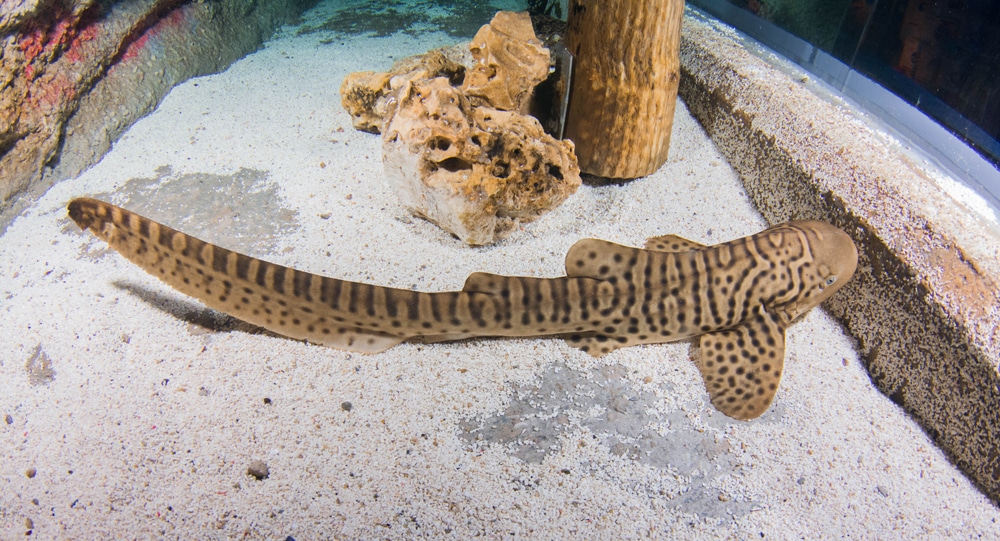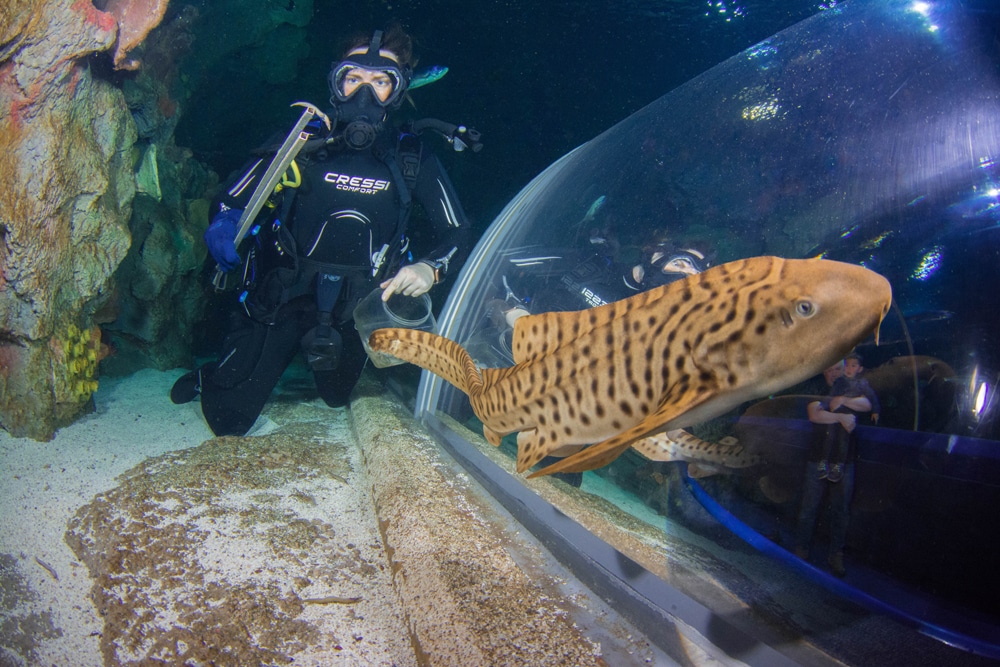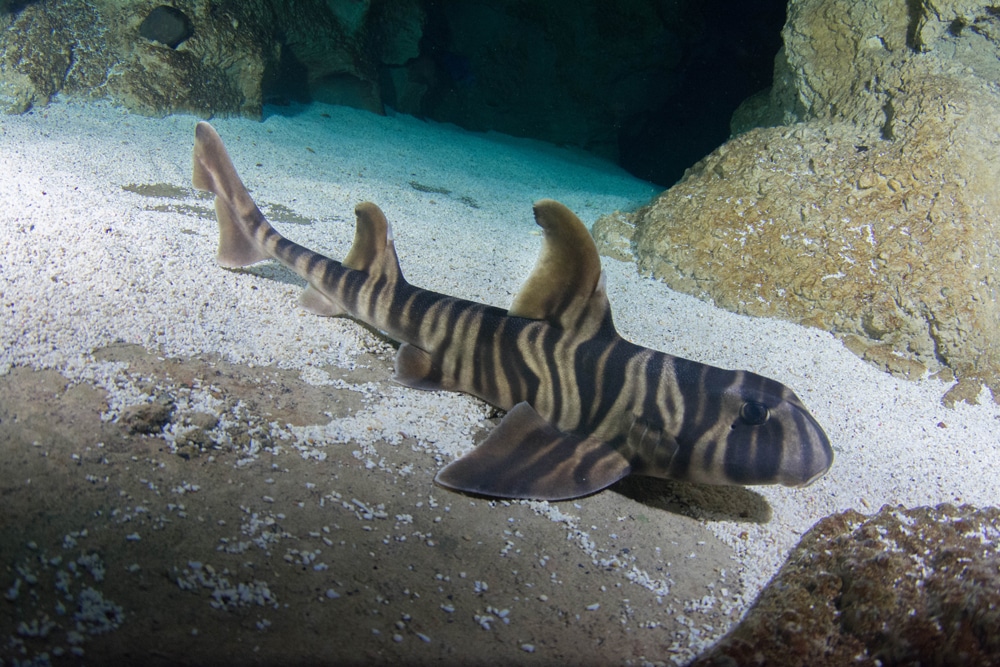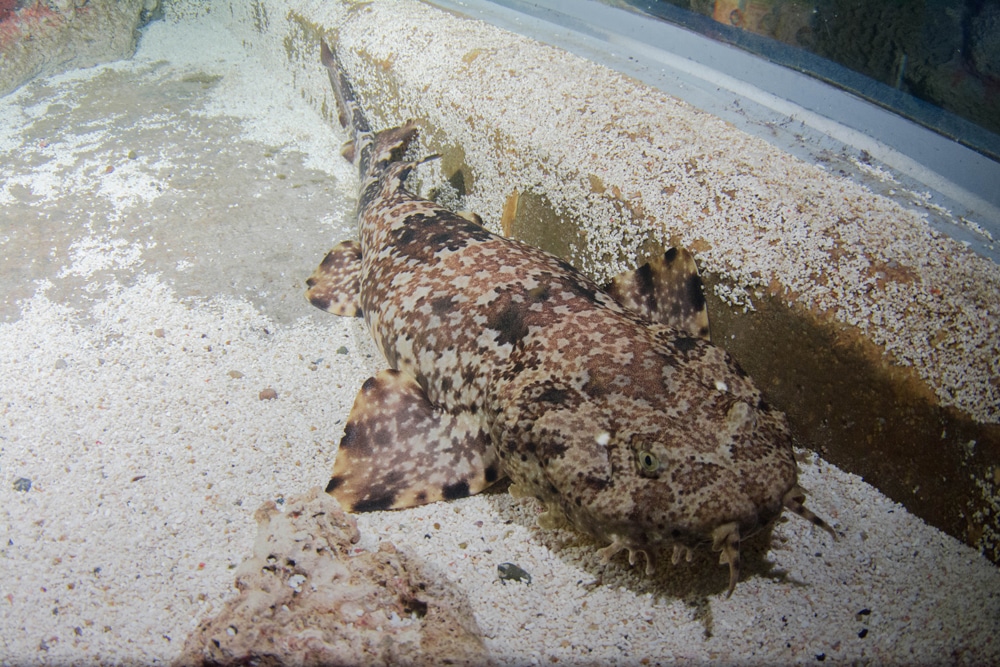Marine Life & Conservation
New Arrivals at Blue Planet Aquarium

 There’s been exciting times recently here at Blue Planet Aquarium, as we have had some new arrivals. When we get new arrivals its always an exciting time to be working in the Aquarium, however recently we’ve had some truly unique and unusual animals to join the rest of our collection of animals. So, this blog is going to be covering the newest members of the Blue Planet family, and why their uniqueness is so beneficial to our other animals.
There’s been exciting times recently here at Blue Planet Aquarium, as we have had some new arrivals. When we get new arrivals its always an exciting time to be working in the Aquarium, however recently we’ve had some truly unique and unusual animals to join the rest of our collection of animals. So, this blog is going to be covering the newest members of the Blue Planet family, and why their uniqueness is so beneficial to our other animals.
The new animals in question are Sharks with one being from a species we already have at the aquarium and two being completely new to the aquarium. Here at Blue Planet Aquarium we’re constantly trying to educate our visitors and show them new ways to appreciate our underwater world and the animals that we have living on this planet we call home.
So, lets dive straight in (no pun intended).
We’re going to start today with an animal that we already have two of and have had at the aquarium for several years, we have one teenage male named Marty (Named after the zebra from the Madagascar film) and Stripes (Named after Racing Stripes) however this new one is still a very young Shark and is a female who we’ve named Deborah the Zebra.
This species is also a hugely popular species here at Blue Planet and I would probably say are a favourite of mine, I am of course talking about our Zebra Shark. Zebra Sharks are identified by their yellowish- brown colouration with a spotty pattern covering their body, people usually ask at this stage why they’re called Zebra Sharks if they have spots. They’re called Zebra Sharks because when they’re young they’ve got Black & White Stripes all the way down their body, similar to that of a zebra, this species also has the second longest tail in the Shark world after the Thresher Shark.
The long tail combined with their striped pattern makes them look similar to that of the White-banded Sea Snake which has also lead some scientists to believe that this species may mimic the snake to deter predators, if this is the case then this would be the first case of protective mimicry in Sharks. Zebra Sharks are also one of the few Sharks that we know exhibit parthenogenesis which means that this species can lay viable eggs without a male needed, however all the pups born through this process will all be females. Zebra Sharks have also been found to share a very close relation to that of the world’s largest fish, the Whale Shark, we know this as their DNA is very similar and the Zebra Shark shares very similar features.
Our Zebra Sharks are all hand fed and eat a wide variety of foods such as Mackerel, Whiting, Saury, Squid and hard-shelled food such as Razor Clam. They’re incredibly friendly and regularly come in to investigate what’s going on, they’ll often rest against us and seem to show interest in having physical contact with members of the dive team, however we try and limit this as they wouldn’t get it in the wild, although sometimes we have to in order to stop them from trying to steal all the food or keep them at a distance that we can work with.
The next new Shark member is our Zebra Bullhead Shark, this is one of the more unusual Shark species that we have. It’s a member of the of the Horn Shark Family which is the same family of sharks as the Port Jackson Shark, this shark is very striking as it has very obvious Black and White Stripes and even more unusually, a small spike on both the Dorsal fin and Second Dorsal Fin which is where the name “Horn Shark” comes from. In this species early stages of life, they have a very similar striped pattern as their adult stage however their black stripes are more of a reddish-brown.
This species in the wild feeds mainly on hard-shelled foods such as crabs and molluscs however they wouldn’t say no to fish, ours is fed on fish, squid, razor clam and Mussel. Here at Blue Planet Aquarium we have just one Zebra Bullhead and ours is a male, this shark along with the next species I’ll be talking about are not yet named as we are having our guests choose names for us. Zebra Bullheads lay eggs rather than live birth, like mammals, and this group of sharks is a very ancient group with a long fossil record, that date these sharks all the way back to the early Jurassic which was around 201 million years ago.
The last two species are some of my personal favourites, which are known as Wobbegong Sharks. The name Wobbegong comes from the aborigine word for “Shaggy Beard”, this has led to them being lovingly known as “Wobbies” in Australia and among Shark enthusiasts. We have two species of Wobbegong here at Blue Planet Aquarium we have one Western Wobbegong and one Spotted Wobbegong, they both look vastly different in their patterns and markings and are one of the most unique and unusual Shark species.
Wobbegongs are Ambush predators that lie motionless on, or in, the seabed, rocky overhangs, crevices and caves. They wait to allow their camouflage to help them blend in with their surroundings, they do this until fish and other small animals come within striking range for the best chance of a successful hunt. To add success to a hunt it has been observed with the Tasselled Wobbegong, that they take part in active luring behaviour which is something seen in animals such as the Frogfish or Alligator Snapping Turtle. This is done with the Shark wedging itself into a cave or crevice with its head at the entrance and the tail curled over the top of its head, they then wave their tail side to side to mimic another fish, this is done to create the illusion that the cave is safe and free from predators and its then that the Shark strikes, grabbing any fish that comes too close.
Here at Blue Planet we feed ours on Squid, Mackerel, Saury, Sprat, Sand Eel and Prawn and we feed them via long pole. We do this as the strike from a Wobbegong is so quick that the human eye cant register it straight away, this also allows us to mimic hunting behaviour by giving the food a “swimming motion” to it which allows the animals to pick their target and hunt for their food rather than just feeding them.
These sharks are really important to us here at the aquarium as not only are they amazing and beautiful but they’re unusual looks and nature make them a reference point to just how diverse and incredible the Shark family is, sure everyone knows what a Hammerhead and Whale Shark is and as amazing as they are its always humbling to be able to show our guests just how unusual the Shark family can be along with the amazing traits and behaviours that comes along with them.
So, there you have it, some wonderful new arrivals here at Blue Planet Aquarium with each one being as amazing as the last. When you’re next at Blue Planet keep an eye out for these amazing new arrivals and make sure to appreciate just how strange and unique they are. Keep an eye out for future new arrivals and I’ll see you in the next blog.
For more information about Blue Planet Aquarium please visit their website by clicking here.
Marine Life & Conservation
Double Bubble for Basking Sharks

 The Shark Trust is excited to announce that, for two more days only, all donations, large or small, will be doubled in the Big Give Green Match Fund!
The Shark Trust is excited to announce that, for two more days only, all donations, large or small, will be doubled in the Big Give Green Match Fund!
Donate to Basking in Nature: Sighting Giants
The Shark Trust is hoping to raise £10k which will be doubled to £20k. This will go towards Basking in Nature: Sighting Giants. And they need YOUR help to reach they’re goal.
The Shark Trust’s citizen science project is to monitor and assess basking sharks through sightings; encouraging data collection, community engagement, and promoting nature accessibility. This initiative aims to enhance health and wellbeing by fostering a deeper connection with British Sharks.
Campaign Aims
- Increase citizen science reporting of Basking Sharks and other shark sightings to help inform shark and ray conservation.
- Provide educational talks about the diverse range of sharks and rays in British waters and accessible identification guides!
- Create engaging and fun information panels on how to ID the amazing sharks and rays we have on our doorstep! These can be used on coastal paths around the Southwest. With activities and information on how you can make a difference for sharks and rays!
- Promote mental wellbeing through increasing time in nature and discovering the wonders beneath the waves!
Donate, and double your impact. Click Here
Marine Life & Conservation
Leading UK-based shark conservation charity, the Shark Trust, is delighted to announce tour operator Diverse Travel as a Corporate Patron

 Corporate Patrons provide a valuable boost to the work of The Shark Trust. The Trust team works globally to safeguard the future of sharks, and their close cousins, the skates and rays, engaging with a global network of scientists, policymakers, conservation professionals, businesses and supporters to further shark conservation.
Corporate Patrons provide a valuable boost to the work of The Shark Trust. The Trust team works globally to safeguard the future of sharks, and their close cousins, the skates and rays, engaging with a global network of scientists, policymakers, conservation professionals, businesses and supporters to further shark conservation.
Specialist tour operator Diverse Travel has operated since 2014 and is committed to offering its guests high quality, sustainable scuba diving holidays worldwide. Working together with the Shark Trust will enable both organisations to widen engagement and encourage divers and snorkellers to actively get involved in shark conservation.
“Sharks are truly at the heart of every diver and at Diverse Travel, we absolutely share that passion. There is nothing like seeing a shark in the wild – it’s a moment that stays with you forever!” says Holly Bredin, Sales & Marketing Manager, Diverse Travel.
“We’re delighted to celebrate our 10th year of business by becoming a Corporate Patron of the Shark Trust. This is an exciting partnership for Diverse and our guests. We will be donating on behalf of every person who books a holiday with us to contribute towards their vital shark conservation initiatives around the world. We will also be working together with the Trust to inspire divers, snorkellers and other travellers to take an active role – at home and abroad – in citizen science projects and other activities.”
Paul Cox, CEO of The Shark Trust, said:
“It’s an exciting partnership and we’re thrilled to be working with Diverse Travel to enable more divers and travellers to get involved with sharks and shark conservation. Sharks face considerable conservation challenges but, through collaboration and collective action, we can secure a brighter future for sharks and their ocean home. This new partnership takes us one more valuable step towards that goal.”
For more information about the Shark Trust visit their website here.
For more about Diverse Travel click here.
-

 News3 months ago
News3 months agoHone your underwater photography skills with Alphamarine Photography at Red Sea Diving Safari in March
-

 News3 months ago
News3 months agoCapturing Critters in Lembeh Underwater Photography Workshop 2024: Event Roundup
-

 Marine Life & Conservation Blogs3 months ago
Marine Life & Conservation Blogs3 months agoCreature Feature: Swell Sharks
-

 Blogs2 months ago
Blogs2 months agoMurex Resorts: Passport to Paradise!
-

 Blogs2 months ago
Blogs2 months agoDiver Discovering Whale Skeletons Beneath Ice Judged World’s Best Underwater Photograph
-

 Gear Reviews3 weeks ago
Gear Reviews3 weeks agoGEAR REVIEW – Revolutionising Diving Comfort: The Sharkskin T2 Chillproof Suit
-

 Marine Life & Conservation2 months ago
Marine Life & Conservation2 months agoSave the Manatee Club launches brand new webcams at Silver Springs State Park, Florida
-

 Gear Reviews3 months ago
Gear Reviews3 months agoGear Review: Oceanic+ Dive Housing for iPhone





















